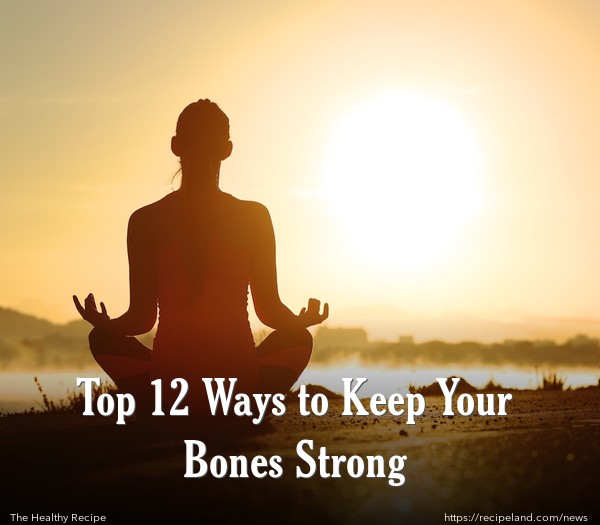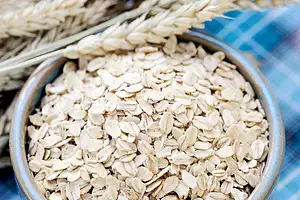Breaking a bone is scary business. Keeping your bones healthy, throughout your entire life, is very important. If you are lucky enough to have never had a broken bone, you definitely know someone who has had this unfortunate experience.
Most broken bones occur in women, and most of the women are over the age of 50. Ethel Siris, M.D., from the Toni Stabile Center for Osteoporosis at Columbia Presbyterian Medical Center states, "One out of every two women over the age of 50 will break a bone in their lifetime due to osteoporosis." That’s a pretty scary statistic.
Broken bones are not only painful, but they require long periods of treatment, often leading to time off work and potential disability, and they can have lifelong effects and often those who break bones will have problems for the rest of their lives as a result. Prevention of broken bones is a priority.
Here are 12 important steps that you can take to minimize the chances of breaking a bone and having long term problems as a result.
1. Maintain bone density and prevent bone loss.
For women, peak bone mass tends to occur by age 30. After that, bones begin to deteriorate, in a process called “remodelling.” This refers to a process in which your entire skeleton is replaced about every 7 years or so. After menopause, bone density tends to drop significantly, and the replacement skeleton is not nearly as strong as the original versions. To keep bone density at its highest levels, you want to make sure to consume enough calcium to compensate for the age-related changes. Low fat dairy products, leafy greens, fortified cereals and sardines are all excellent sources of calcium. Calcium supplements can also help, if you are not getting enough from natural sources. The recommended daily dose for premenopausal women is 1000mg, while post-menopausal women should be getting 1200mg daily.
2. Make sure you are getting sufficient Vitamin D.
Vitamin D is critical for building healthy bones. It can play a significant role in helping your bones rebuild themselves as they are remodelling. Vitamin D helps to promote the absorption of calcium. Studies have shown that more than 50% of adults are not getting enough Vitamin D. For those under the age of 50, it is recommended that you get 600 IUs daily. For those with bone problems, a higher dose of 1000-2000 IUs is recommended. Great sources of Vitamin D include cod liver oil, salmon, canned tuna, Vitamin D fortified milk, egg yolks, and sun exposure.
3. Limit the amount of caffeine you consume.
Studies suggest that consuming high amounts of caffeine can limit the absorption of Vitamin D. Those with more than 300mg per day of caffeine in their diet may be at a higher risk for hip fractures. Small amounts may not be harmful, but be careful of certain sneaky sources like supplements or sports drinks.
4. Meditate your way to stronger bones.
Yoga is recognized as a great way to strengthen bones, and it has relaxing benefits, too. Studies have shown that those who do at least 10 minutes of yoga per day had higher bone densities in the hip and spine areas, compared with those who never did yoga. For those at higher risk for fractures, or already diagnosed with low bone density, skip any high impact yoga and stick to the low impact varieties.
5. Small amounts of alcohol may help protect bones.
Excessive amounts of alcohol, defined as more than a glass or two of wine or two beers per day is known to cause bone loss. But, small amounts of alcohol, especially wine, may help to retain bone density in pre- and post-menopausal women.
6. Protect your bones!
Avoiding falls is a good way to protect your bones. Taking part in dangerous or high impact activities may put you more at risk, especially women over the age of 45. Women are more than twice as likely to break an arm in a fall than men, probably because they are more likely to suffer from osteoporosis. Losing bone density places one at a much higher risk for breaks in a fall. Be sure that your home is safe, and that you are careful during all activities of daily living and exercise. It is important to always be mindful of your surroundings so that you can avoid falling.
7. Know the risks associated with any medications that you may take.
Certain medications may have a negative effect on bone density. The most common culprits are those drugs used to treat asthma or rheumatoid arthritis. Certain SSRIs that are prescribed to treat depression can also affect bone density. Be sure to talk frankly with your doctor about the possible side effects and, especially, the effects on your bone density, related to any medications prescribed. Counteract any side effects by following these bone density enhancing tips.
8. Get regular bone density testing.
Unfortunately, despite research that shows how helpful bone density testing is for detecting potential problems, only about a third of women in their 60s have had bone scan testing to evaluate their bone density. This testing helps to reveal the risk of osteoporosis, and can help people know whether or not they are at risk for a broken bone as a result of a fall. All women should have a bone density test during their 50s if they have any risk factors, such as a previous broken bone. If there are not any risk factors, then all women should have bone density testing by age 65.
9. Keep some meat on your bones.
Those with eating disorders or body fat levels that are especially low are at a higher risk for having bone density issues. Those who are too thin may be depriving their bones of healthy proteins, required for the remodelling process. Dieting excessively can lead to bone loss. Healthy weights should be maintained.
10. A Mediterranean diet is best.
It is now fairly well recognized that eating a Mediterranean diet has many health benefits. The main component in this kind of diet emphasize omega-3 fatty acids as well as other monounsaturated fats. These are known to be good for bone density. For your own bone density, consider replacing any regular fats with olive oils and other fatty fish oil sources. Limiting your consumption of red meat can also help.
11. Quit smoking, now!
When you smoke, you introduce not only nicotine, but you encourage the development of free radicals into your system. Free radicals interfere with your body’s ability to produce osteoblasts, which are the types of cells that increase bone density. Because of this, smoking can increase your risk of fractures. Post-menopausal women who quit smoking for one year have shown greater bone density than their smoking peers.
12. Add resistance training.
Another great way to increase bone density, and prevent bone loss, is to use resistance training in your exercise routine. Athletes of all types show greater bone density than their non-active peers, at any age. Lifting weights, gymnastics and soccer are recognized as some of the best ways to accomplish this. Not only will this type of exercise strengthen your bones, but it will also help to increase your muscle mass and thereby reduce the risk of injury in the event of any fall.
Ultimately, staying strong and healthy, and taking measures to increase your bone density and decrease the rate of bone loss as you age will help prevent fractures and other problems that can lead to chronic health conditions.










Comments